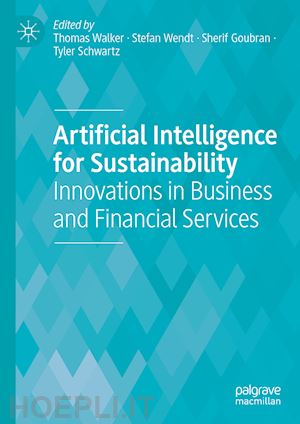
Questo prodotto usufruisce delle SPEDIZIONI GRATIS
selezionando l'opzione Corriere Veloce in fase di ordine.
Pagabile anche con Carta della cultura giovani e del merito, 18App Bonus Cultura e Carta del Docente
In light of the climate crisis, businesses are expected to embrace sustainability to reduce their negative impacts on the environment and society, while at the same time strengthening their organisations’ positive impacts. Managing this alongside the traditional requirements of business requires careful handling, and it is small wonder that some are heralding the advantages posed by artificial intelligence (AI) as the missing piece of the puzzle. This edited book aims to present a balanced discussion of the benefits and costs of using AI for the natural environment and society, including an analysis of its potential to help meet the UN’s Agenda 2030 and the Sustainable Development Goals. Researchers, practitioners, regulators, and entrepreneurs at the forefront of sustainable AI solutions share insights into the different sustainable applications of AI and highlight how these new developments may affect and contribute to our fight against climate change and address further environmental and social challenges. This volume will be of great interest to scholars and students of digital business and new technologies, sustainability, and strategy.
Chapter 1. Artificial Intelligence for Sustainability: An Introduction.- Chapter 2. Fast Fashion’s Fate: Artificial Intelligence, Sustainability, and the Apparel Industry.- Chapter 3. Artificial Intelligence and the Global Automotive Industry.- Chapter 4. The Emergence of the Nighttime Artificial Intelligence Robot-Driven Economy.- Chapter 5. Strengthening the Sustainability of Artificial Intelligence: Fostering Green Intelligence for a More Ethical Future.- Chapter 6. Predictive Machine Learning in Assessing Materiality: The Global Reporting Initiative Standard and Beyond.- Chapter 7. Artificial Intelligence and the Food Value Chain.- Chapter 8. Analysis of Smart Meter Data for Energy Waste Management.- Chapter 9. The Role of Artificial Intelligence in Uncovering Synergistic Partnerships between Philanthropic Actors Beneficial to the Achievement of the Sustainable Development Goals.- Chapter 10. The Potential Role of Artificial Intelligence in the Commercialization of Traditional Medicines in Tropical Regions.
Thomas Walker is a Professor in the Department of Finance at the John Molson School of Business, Concordia University, Canada. His research interests are in emerging risk management, corporate finance, venture capital, sustainability and climate change, FinTech, corporate governance, securities regulation and litigation, insider trading, and institutional ownership, and he has published over 80 articles, book chapters, and edited books in these areas.
Stefan Wendt is a Professor and Dean in the Department of Business at Bifröst University in Iceland. His fields of research include corporate finance and governance, sustainability and ESG investing, risk management, FinTech and digitalization, financial markets and financial intermediation, small and medium-sized enterprises, and behavioural finance.
Sherif Goubran is an Assistant Professor at the Department of Architecture, School of Sciences and Engineering, at the American University in Cairo, Egypt. His work investigates the theory and practice of sustainability in buildings and future sustainable built environments. His research combines qualitative and quantitative methodologies and explores the shift from incremental to transformational design.
Tyler Schwartz is a Research Assistant at the John Molson School of Business, Concordia University, Canada. His research interests include predictive modelling, bio-statistics, sports analytics, sustainability, FinTech, and machine learning.











Il sito utilizza cookie ed altri strumenti di tracciamento che raccolgono informazioni dal dispositivo dell’utente. Oltre ai cookie tecnici ed analitici aggregati, strettamente necessari per il funzionamento di questo sito web, previo consenso dell’utente possono essere installati cookie di profilazione e marketing e cookie dei social media. Cliccando su “Accetto tutti i cookie” saranno attivate tutte le categorie di cookie. Per accettare solo deterninate categorie di cookie, cliccare invece su “Impostazioni cookie”. Chiudendo il banner o continuando a navigare saranno installati solo cookie tecnici. Per maggiori dettagli, consultare la Cookie Policy.